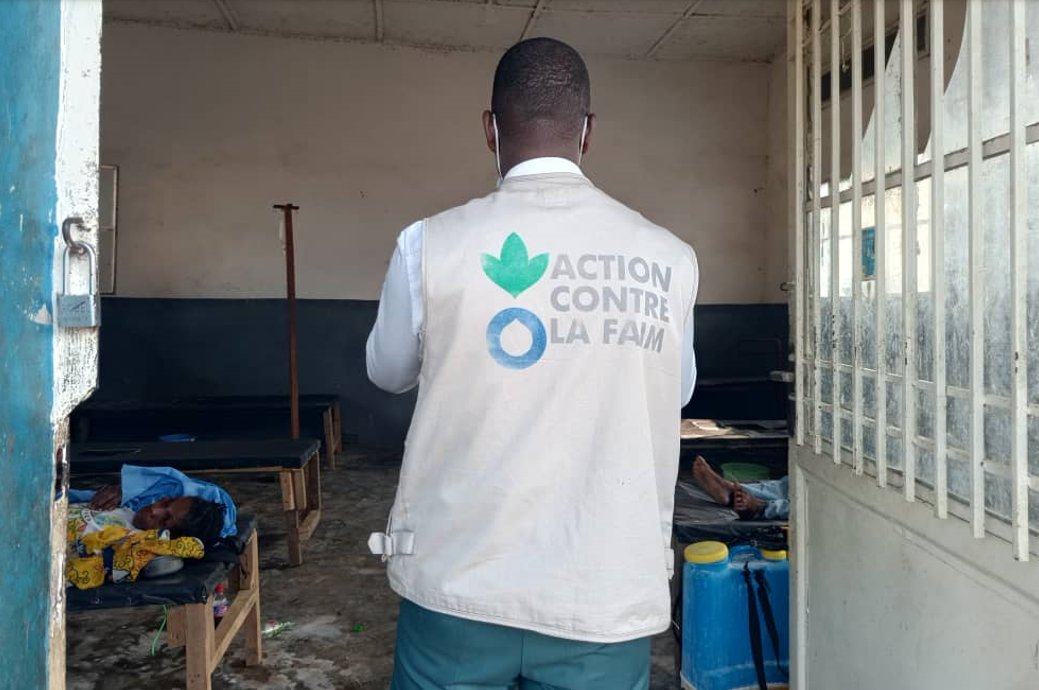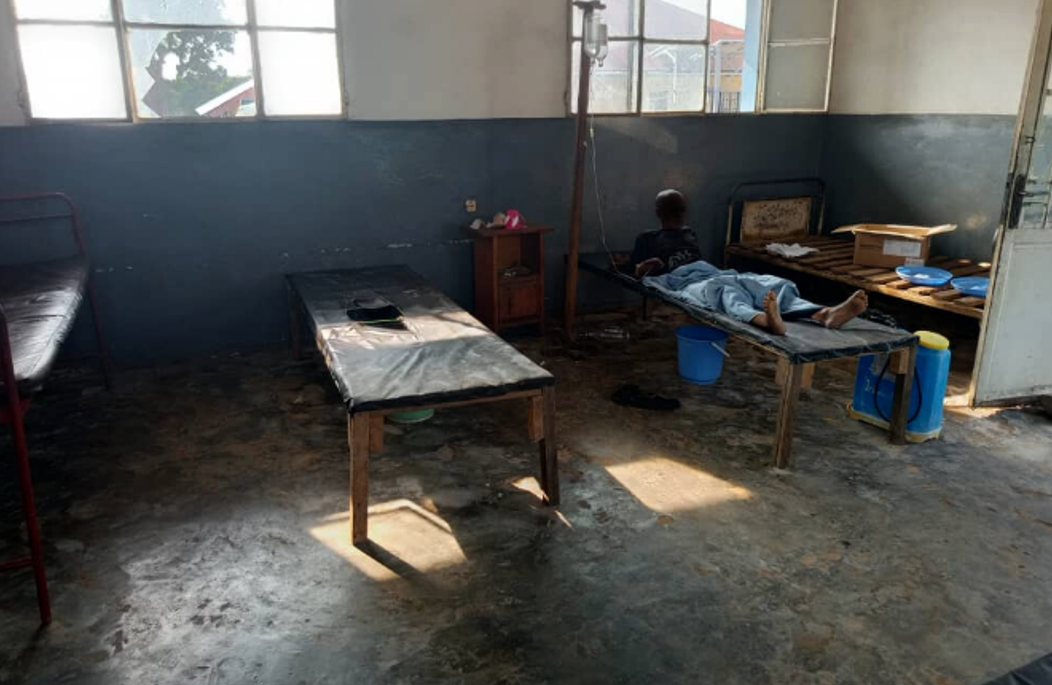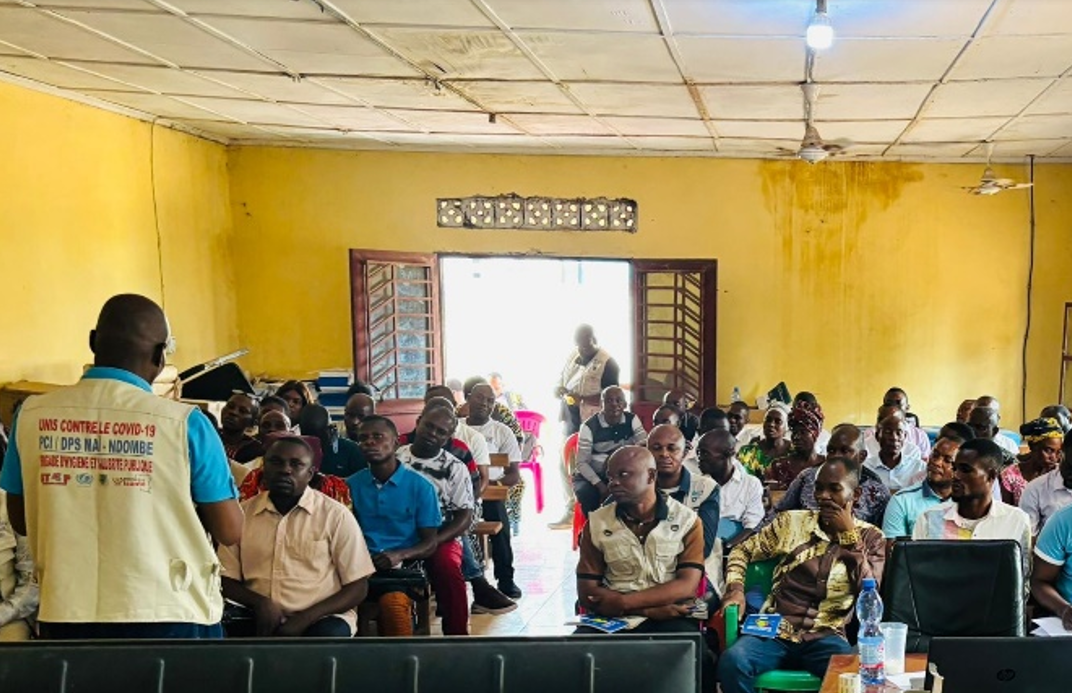

DR Congo: We Take Action Against Cholera in Kwamouth
In Kwamouth, in the province of Maï-Ndombe, north of Kinshasa, a cholera outbreak has been raging. Action Against Hunger, a rare humanitarian player in this area, where health infrastructures have been particularly badly affected since 2023, is deploying an emergency response to the epidemic, whose 25% mortality rate is raising fears of a rapid deterioration in the situation.
"We have been working in Kwamouth since mid-2023, following the conflict in 2022 and its impact on communities. We are in an area where the needs in terms of access to healthcare, in terms of available medicines, equipment and health staff, are critical. The medicines needed to treat cholera are already out of stock in local health centres", explains Julie Drouet, deputy country director for Action Against Hunger's programmes in the Democratic Republic of Congo.

Local health centers are receiving people affected by cholera. Photo: Action Against Hunger
An epidemic of cholera, a disease endemic to the DRC, has been raging in the area. This water-borne disease is mainly characterised by severe watery diarrhoea, accompanied by vomiting, which can lead to rapid dehydration and death within a few hours. People suffering from malnutrition are particularly at risk. However, when patients are treated quickly, recovery is rapid thanks to oral rehydration solutions and even antibiotics in the most serious cases.
In Kwamouth, 43 cases have been recorded, including 7 deaths, bringing the fatality rate to 16%, some health zone reaching more than 20% of fatality rate. Those are extremely high rates, even though the origin and spread of the cases have not yet been identified. "Our epidemiologist is on the site to analyse the situation. We are particularly concerned because cases have been recorded in the Kwamouth general hospital, but also in the health centres on the banks of the river: with several outbreaks scattered around, there is a risk that the disease will spread extremely rapidly", adds Julie Drouet.
Situated on the banks of the River Congo, a busy river route for transporting people and goods in an area where land routes are in poor condition, Kwamouth is 500 km from the capital Kinshasa, where three-quarters of the city's health zones have also been affected by cholera, following recent flooding. Opposite Kwamouth is Congo-Brazzaville, with which there is a great deal of trade and movement of people, increasing the risk of cross-border spread.
Preventing and treating cholera: our emergency team on the ground
Across the country, Action Against Hunger is supporting 15 health centres as well as the Kwamouth general hospital, and its mobile clinic covers 8 sites. To strengthen this support for health facilities in the face of the cholera epidemic, ACF teams have begun supplying medicines - including oral rehydration solutions - to the Kwamouth hospital and have sent an emergency team to prevent the risks associated with the disease and its spread, with the support of the Swedish International Development Cooperation Agency.

The teams provide training on detecting cholera and promoting good hygiene practices, the use of protective equipment, and prevention in health centers. Photo: Action Against Hunger
The aim is to train health workers and community relays in identifying the disease, raising awareness of good hygiene practices, informing the public about the disease, the use of personal protective equipment and infection prevention and control measures in health centres.
Alongside these capacity-building measures for health staff, the teams will be carrying out household disinfection campaigns for cases whose origin has been identified.
The epidemiologist from Action Against Hunger in RDC is also part of the staff deployed. In recent years, our teams in the country have developed extensive experience in responding to epidemics of measles, cholera, Mpox, ebola, marburg and anthrax, particularly in analysing health data with a view to identifying, monitoring and controlling epidemics, and in monitoring epidemiological trends in order to anticipate future developments. We are helping to build the capacity of its partners to prevent epidemics, and we provide technical support in implementing strategies tailored to epidemic contexts.
In Kwamouth, conflict and displacement are breeding grounds for malnutrition in a context of uncertain funding
"Following the conflict, only 40% of the health areas are operational, making it difficult for people to access healthcare, and there are very few players present," adds Julie Drouet.
The territory of Kwamouth and its eponymous city have been in the grip of inter-community conflict since July 2022, which has displaced more than 220,000 people and also affected neighbouring provinces. The violence has led to the deterioration or destruction of health centres, an increase in food prices in this predominantly agricultural area, which used to supply part of Kinshasa, and a rise in cases of acute malnutrition in children under the age of five.
Our nutritional surveys showed alarming rates of malnutrition: 15.3% prevalence of global acute malnutrition and 2.8% for severe acute malnutrition (SAM).
"In 2024, we cared for 2,940 children suffering from SAM and treated more than 25,000 children for childhood illnesses in 16 health facilities in the Kwamouth area. But these figures only reflect part of the reality," stresses Julie Drouet. As we have only been working with communities for two years to treat children suffering from severe acute malnutrition, trust is gradually being built up and people are beginning to know that their children can be treated free of charge. In some areas, when we carry out screening, we find up to 6% of children suffering from severe acute malnutrition, which leads us to believe that the number of cases will only increase over time and that people need support more than ever, whether it's for health or the fight against cholera".
